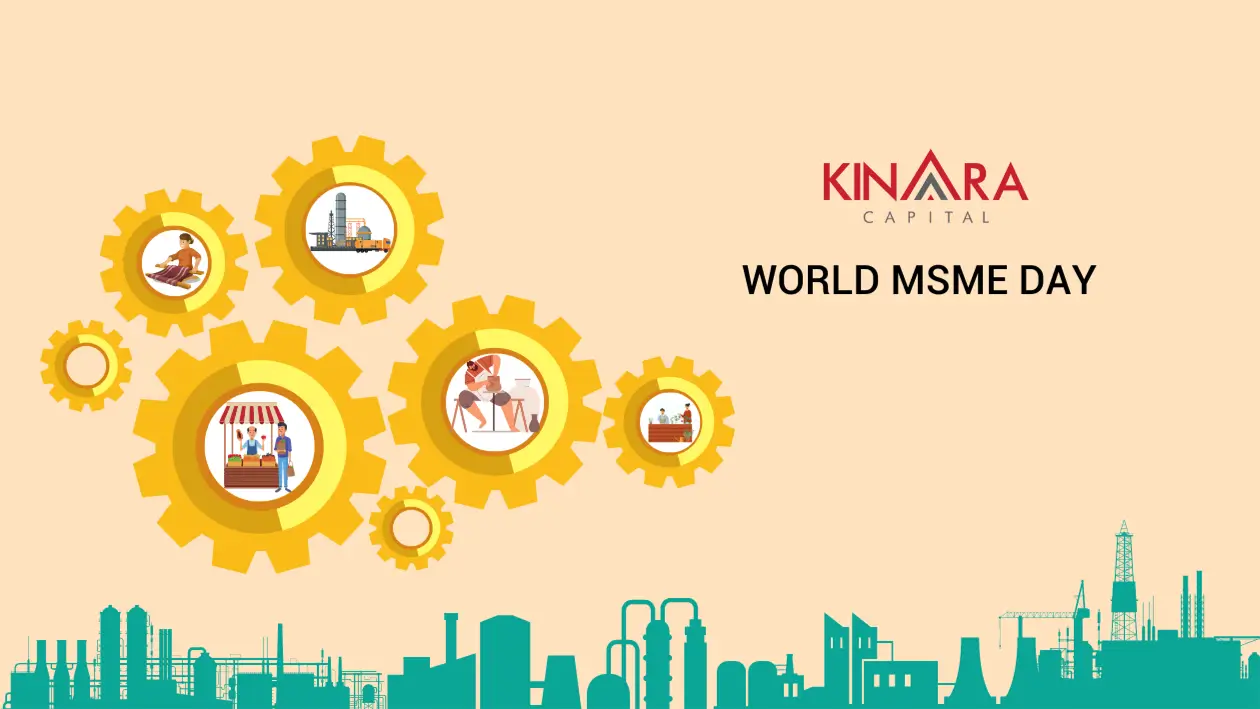
Micro Small and Medium Enterprises (MSMEs) play a vital role in the economic growth and development of nations across the globe. MSME Day is observed annually on June 27th to celebrate these enterprises and recognize their importance, shed light on their contributions, and promote their growth and sustainability.
The MSME Day 2023 celebration will mark the sixth anniversary of the UN General Assembly’s decision to recognize the importance of MSMEs and their role in the global economy. This day serves as a platform for world leaders to convene and engage in discussions pertaining to the chosen theme, with the aim of formulating policies that promote growth in those areas. This article delves into the history of MSME Day, explores its significance, and highlights the impact of MSMEs on economies worldwide.
MSME Day was officially designated by the United Nations General Assembly to raise awareness about the importance of MSMEs in achieving sustainable development goals. The first MSME Day was celebrated on June 27th, 2017, as a result of a resolution adopted by the UN General Assembly in April 2017.
The decision to establish MSME Day recognized the significant contributions made by MSMEs to employment generation, poverty alleviation, innovation, and inclusive economic growth. The resolution emphasized the need to support and promote these enterprises through various policies, programs, and initiatives.
On the occasion of MSME day, the UN reveals a theme that denotes the priority focus area for the advancement of MSMEs as recognized by the organization for that specific year. As per historical precedent, the UN will reveal the MSME Day 2023 theme on the day of the event itself. The themes of MSME Day are chosen to reflect the current challenges and opportunities facing MSMEs around the world. The themes also highlight the importance of MSMEs to the global economy and their role in sustainable development. Here are all the themes of MSME Day till date:
This theme highlighted the significant contribution of MSMEs to the global economy. MSMEs account for a large share of employment and Gross Domestic Product (GDP) in most countries, and they play a vital role in driving economic growth and development.
The focus of the theme was the contribution of young people’s creativity and entrepreneurship to the growth of MSMEs. The theme also emphasised the need to develop an environment that is supportive of young people starting and expanding their enterprises.
In order to achieve the Sustainable Development Goals (SDGs), this theme emphasised the significance of finance for MSMEs.
The topic was chosen in order to draw attention to the effects of the Covid-19 outbreak on MSMEs and to stress the importance of aiding these businesses at this tough time.
This theme highlighted the importance of MSMEs in the global economy and their role in ensuring an equitable and sustainable post-Covid-19 recovery.
This theme emphasised the need for MSMEs to be resilient in the face of difficulties like conflict and climate change. MSMEs must be able to adapt to change and prosper in an unstable environment.
7. MSME Day 2023: Building a Stronger Future Together
The MSME Day theme 2023 highlighted the importance of collaboration and innovation in empowering these businesses to overcome challenges and drive sustainable growth. By focusing on collective efforts, MSME Day 2023 aimed to create an active network for MSMEs worldwide to connect, learn, and grow collectively.
8. MSME Day 2024: MSMEs and the SDGs
The MSME Day theme for 2024 is on Leveraging the Power and Resilience of Micro-, Small and Medium-sized Enterprises to Accelerate Sustainable Development and Eradicate Poverty in Times of Multiple Crises.
The 2024 MSME Day presents an opportunity for key stakeholders, including policymakers, large companies, financial institutions, and the international community, to discuss and exchange ideas on supporting micro, small, and medium-sized businesses. This collaboration aims to advance the 2030 Agenda and contribute to achieving the SDGs, such as eradicating poverty and ensuring decent work for all.
MSMEs are an essential component of the world economy, accounting for 90% of businesses, 60–70% of jobs, and 35% of the global GDP in developing and 50% in industrialised nations. By highlighting the significance of MSMEs and their contribution to sustainable development and economic progress, MSME Day provides a chance to increase public awareness of MSMEs.
MSMEs are essential for fostering innovation, creating jobs, and advancing economic progress. They are a significant source of employment for young people and women. The chance to emphasise MSMEs’ contributions to sustainable development and economic progress is provided by MSME Day.
MSMEs have made significant contributions to the global economy, but they often face challenges such as access to finance, markets, and technology. MSME Day is an opportunity to celebrate the achievements of MSMEs and to commit to supporting their growth and development.
Governments may assist MSMEs by granting them access to capital, markets, and technology. MSME Day is a chance to advocate for laws that assist MSMEs.
MSME Day not only serves to raise awareness of the significant value MSMEs bring to the global economy but also acts as a catalyst to motivate individuals to give their business to these enterprises instead of large corporations. By understanding the importance of MSMEs and the positive impact their support can have, people are empowered to contribute directly to the growth and sustainability of these businesses, fostering economic diversity, local entrepreneurship, and community development.

MSMEs play a crucial role in the Indian economy, contributing significantly to employment generation, GDP growth, and export earnings. MSMEs are the second largest employers in India after agriculture, providing significant job opportunities. They contribute to reducing unemployment and poverty by absorbing a large portion of the workforce. MSMEs employed 10.31 million people in FY 2022 in India. They contribute around 30% of India’s GDP. MSMEs have a presence in various sectors like manufacturing, agro-processing, and services driving economic growth and development.
MSMEs also foster entrepreneurship by encouraging individuals to start and run their businesses. They empower aspiring entrepreneurs, especially those from marginalized sections, women, and rural communities. MSMEs contribute significantly to India’s export earnings as well. As per the Forbes Report 2024, there are 633.9 lakh MSMEs in India, with over 99% classified as micro-enterprises, totalling 630.5 lakh. Small businesses account for 3.3 lakh (0.5% of all MSMEs), while medium businesses make up just 0.05 lakh (0.01% of all MSMEs). Rural areas host 324.9 lakh businesses, and urban areas have 309 lakh businesses.
As of February 05, 2024, women-owned MSMEs made up 20.5% of Udyam Portal registrations, contributing 18.73% to employment and 10.22% to turnover. Various initiatives are in place to support their growth and empowerment in the sector. In India, the MSME sector is considered the backbone of the economy due to its potential for entrepreneurship, innovation, and inclusive growth.
On MSME Day, various events are held across India to celebrate the achievements of MSMEs and to highlight their role in the economy. These events include seminars, workshops, exhibitions, and awards ceremonies. The government also announces various schemes and incentives to support MSMEs.
The first MSME Day was celebrated in India in 2017, following a resolution passed by the United Nations General Assembly in April of that year. The UN resolution recognized the importance of MSMEs in promoting sustainable development and achieving the Sustainable Development Goals (SDGs).
MSME Day is an opportunity to celebrate the achievements of MSMEs and to commit to supporting their growth and development. By participating in these activities, people can help to ensure that MSMEs have the support they need to grow and thrive. MSME Day is celebrated in a variety of ways around the world. Some common activities include:
MSMEs are the largest employers globally, providing livelihood opportunities for a significant portion of the workforce. According to the International Labour Organization (ILO), MSMEs account for about 70% of total employment in most countries. They create jobs in both urban and rural areas, contributing to poverty reduction, social well-being and strengthening local economies.
MSMEs contribute significantly to national economies by boosting GDP. Their collective output, when combined, forms a substantial share of a country’s overall economic output. The expansion of MSMEs is a surefire way to boost GDP, and they are often the foundation of economic development.
MSMEs play a crucial role in international trade by participating in export activities. They often specialize in niche products, handicrafts, and unique services that have a global demand. By promoting export-oriented MSMEs, countries can tap into new markets, enhance foreign exchange earnings, and improve their trade balance.
MSMEs are hotbeds of technological innovation and adoption. They embrace new technologies, adapt to market trends, and contribute to the digital transformation of industries. By fostering a culture of innovation within MSMEs, nations can drive competitiveness, productivity, and long-term economic growth.
MSMEs form the foundation of entrepreneurial ecosystems by creating an environment conducive to the growth of startups and small businesses. They provide mentorship, market access, and collaboration opportunities for aspiring entrepreneurs. Successful MSMEs often act as role models, inspiring others to start their own ventures and contribute to economic progress.

MSMEs are the lifeblood of the global economy, but they also face a number of hurdles. These hurdles can vary depending on the country or region, but some of the most common include limited access to capital, a shortage of skilled workers, competition from large businesses, complex regulations, and high taxes.
MSMEs often have difficulty accessing financing, which can hinder their growth. This is because they may be seen as high-risk borrowers, and they may not have the collateral or track record required to obtain loans from traditional banks.
MSMEs often have difficulty accessing markets, which can limit their sales and growth. This is because they may not have the resources to reach large-scale markets, or they may not be aware of the opportunities that exist.
MSMEs can benefit from access to technology, such as computers, internet access, and mobile phones. However, many MSMEs do not have access to these technologies, which can limit their productivity and efficiency.
MSMEs often face a complex and burdensome regulatory environment. This can make it difficult for them to comply with the law, and it can also discourage them from starting or expanding their businesses.
MSMEs often lack the skills and training that they need to succeed. This can be a challenge for MSMEs, as they may not have the resources to provide training to their employees.
The Government of India has implemented several measures to promote and support the growth of MSMEs:
Various financial institutions provide loans, credit facilities, and subsidies to MSMEs, enabling them to access capital for business expansion, modernization, and technology adoption. One such NBFC, Kinara Capital recognises the efforts and importance of MSMEs and provide them with financial support through their collateral-free business loans.
Various programs can be launched to focus on enhancing the skills of MSME entrepreneurs and workers through training programs, workshops, and capacity-building initiatives to improve productivity and competitiveness. Institute for Industrial Development (IID), an incubator by the Government of India (GoI) and the Ministry of MSMEs for the development of small entrepreneurs.
Business development services (BDS) provide MSMEs with training, advice, and support on a variety of topics, such as marketing, finance, and management. BDS can help MSMEs to improve their business practices and grow their businesses. Government agencies, nonprofit organizations, financial institutions, consultancy firms, universities, research institutions, and international development organizations are among the providers of BDS. They offer a range of resources such as training programs, consultancy services, mentorship, networking opportunities, and access to financing options. The availability and nature of BDS may vary depending on the location and specific needs of MSMEs.
Networking events provide MSMEs with an opportunity to connect with other businesses, potential customers, and mentors. Networking can help MSMEs to learn about new opportunities, find new customers, and get advice from experienced entrepreneurs.
Governments often offer grants and loans to MSMEs. These programs can help MSMEs to start or grow their businesses, and they can also help to reduce the risk of failure.
In addition to these initiatives, there are many organizations that provide support to MSMEs. These organizations offer a variety of services, such as training, advice, and access to financing. By providing support to MSMEs, these organizations can help to create a more supportive environment for entrepreneurship and business growth. Here are some examples of global organizations that provide support to MSMEs:
MSME Day serves as a reminder of the invaluable contributions made by MSMEs to economies worldwide. These enterprises fuel economic growth, generate employment, foster innovation, and promote inclusive development. By celebrating MSME Day, people acknowledge the pivotal role played by these enterprises and emphasise the need to support and nurture them through effective policies, access to finance, technology adoption, and capacity-building initiatives. Governments, international organisations, and society as a whole must continue working together to create an enabling environment for MSMEs to thrive, ensuring their sustained impact on local, regional, and global economies.
MSME Day provides an opportunity for stakeholders to reflect on the achievements of MSMEs, recognise their challenges, and commit to addressing them. By empowering and promoting the growth of MSMEs, we can harness their potential as engines of economic development, job creation, and social inclusion, ultimately contributing to a more sustainable and prosperous future for all.
MSMEs frequently encounter financial obstacles while trying to grow their businesses since they lack security collateral. To aid the growth of small businesses with funds Kinara Capital, an RBI-registered Systemically Important NBFC in India, caters to their financial needs in the manufacturing, trading and service sectors. MSME owners can avail collateral-free business loans from Kinara within 24 hours by checking their loan eligibility in under a minute in the myKinara app or on the Kinara Capital website.
Kinara provides its services in 7 vernacular languages across 100+ cities covering over 4500+ pin codes. Also, we have a dedicated customer support team available between Monday – Friday (9.30 AM – 6.00 PM) at our toll free number 1800-103-2683 for any questions or assistance. This ensures that entrepreneurs can get the help they need throughout the loan process.
MSMEs drive sustainable development by promoting innovation, creating jobs, and supporting local economies, which helps reduce poverty and boost inclusive growth.
MSMEs contribute to the economy by generating employment, fostering entrepreneurship, and enhancing GDP through the production of goods and services.
MSME Day highlights the vital role of small businesses in economic development, recognising their contributions and raising awareness about their needs and challenges.
MSME Day was established by the United Nations General Assembly on April 6, 2017.
Businesses can participate in MSME Day 2024 by hosting events, sharing success stories, supporting local MSMEs, and promoting awareness through social media and community outreach.
